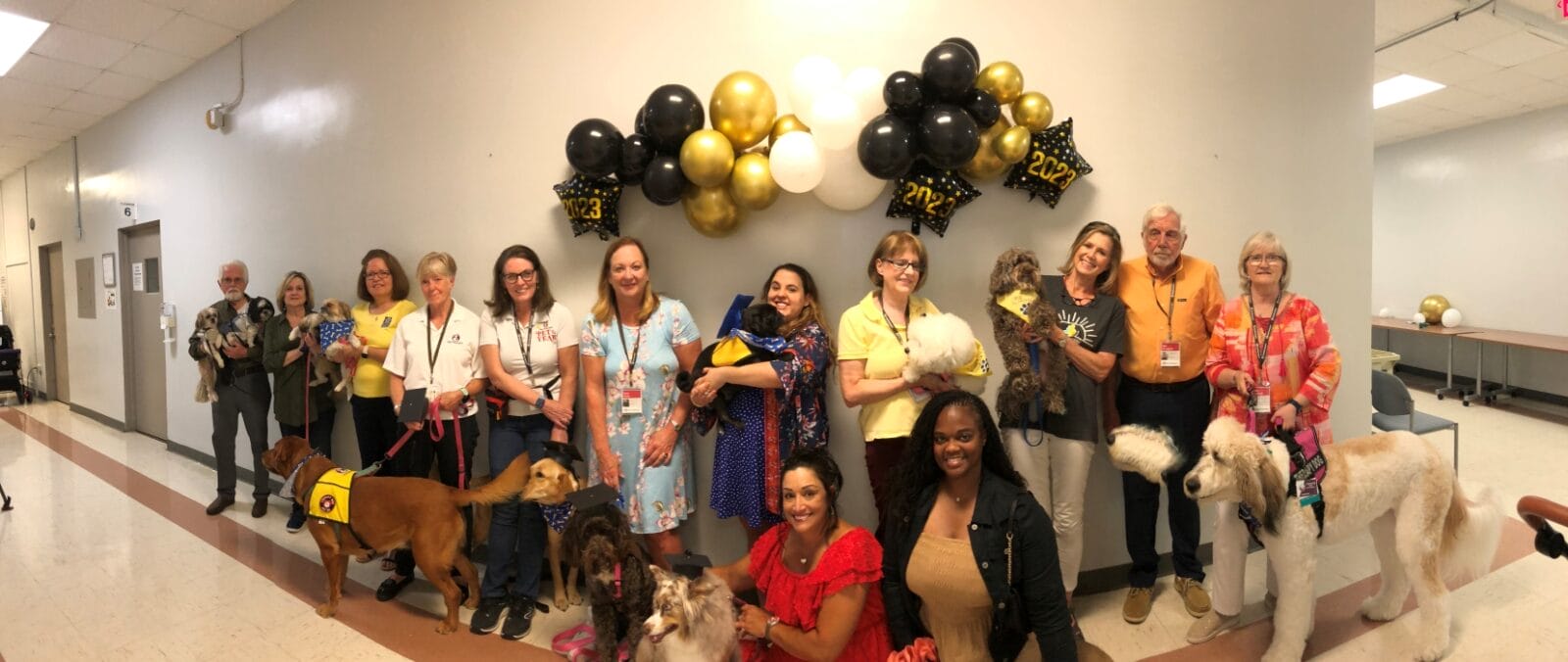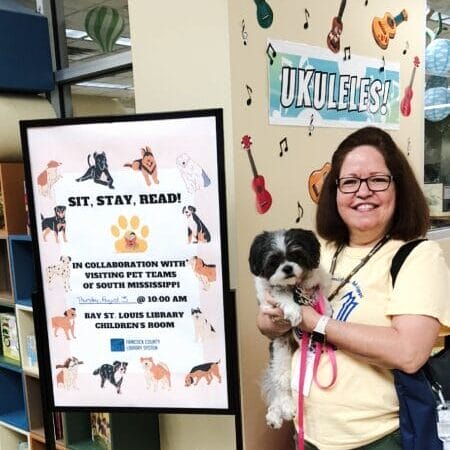Bringing Joy and Comfort to All Ages Through Pet Therapy Across South Mississippi

Meet Daily Point of Light Award honoree Patsy Thomas. Read her story, and nominate an outstanding volunteer or family as a Daily Point of Light.
Patsy Thomas, the founder and president of Visiting Pet Teams of South Mississippi, has dedicated over two decades to spreading joy and comfort through the love of therapy dogs. Patsy’s initial efforts to introduce therapy dogs to hospitals were met with resistance due to strict regulations. However, with determination and support from fellow volunteer Beth, they successfully advocated for the inclusion of therapy dogs at Gulfport Memorial’s inpatient rehab center.
In the aftermath of Hurricane Katrina in 2005, Patsy saw an even greater need for the healing presence of therapy dogs along the Mississippi Gulf Coast. Determined to make a broader impact, she founded Visiting Pet Teams of South Mississippi in 2006. Collaborating with the Humane Society of South Mississippi and the ASPCA’s Joe Elmore, she began recruiting and organizing volunteers to bring the comfort of therapy dogs to more people in need. Their first recruitment event at the “Christmas Pictures with Santa” fundraiser garnered significant interest, leading to their first official meeting in January 2007.
Under Patsy’s leadership, the organization flourished. By 2009, it had grown so large that it outgrew its initial meeting space at the Humane Society and became a standalone 501(c)(3) nonprofit organization. They established partnerships with local nursing homes, launched a reading program and held their first graduation ceremony with Joe Elmore as the guest speaker. Patsy’s dedication and passion attracted numerous evaluators and volunteers who shared her vision, ensuring the continued growth and success of the organization.

Today, the organization boasts 30 registered members and their therapy dogs, who visit local hospitals, including the VA Medical Center, nursing homes, hospice centers and libraries through their “Sit, Stay, Read” program. Patsy’s current therapy dogs, Panda and Sophia, particularly enjoy their time at the libraries, attentively listening to children read aloud.
Read more about Patsy’s journey of growth in leadership with this cause, and why it’s so close to her heart.
Tell us about your volunteer role.
I’m the founder and president of Visiting Pet Teams of South Mississippi. We – myself as well as our 30 volunteers – train our therapy dogs and then bring them for visits to people of all ages, including at the VA Medical Center, an Air Force base, nursing homes, hospice centers, libraries, behavioral care centers and more. I started with a therapy dog who has since passed, but now I have two others, Panda and Sophia, who come to the libraries with me and love the kids.
When I created the group, I was also the coordinator. Then in 2018, I handed that role off to someone really nice who handles that. I do the backend stuff, including the social media, as well as coordinating all the graduation stuff. We had 22 dogs graduate during our last graduation!
Tell us a little bit about the growth of the organization that you’ve seen over time.
You have to have an evaluator to evaluate these dogs, which are evaluated every two years because – like people—they change, they get tired, they get older. We had a woman from Louisiana and she would come all the way over here and evaluate our dogs. She was really awesome; she would schedule her chemo appointments around the evaluations, which was how hard she was trying to help our group. Today, we have four evaluators, so we’re not short of evaluators anymore!
I can’t tell you how many people have gone through our program at this point, but it has to be hundreds. Everyone thinks their dog can be a therapy a dog, so we invite them to our new member orientations. Then, about 50% of those people get registered and help us with the visits. We also have member meetings once a month where we talk about any new rules or regulations as far as pet therapy goes.
Why is this issue so important to you?
Dogs are a great distraction. In a hospital, for instance, everything disappears except for the dog. Dogs are so genuinely affectionate. They don’t care about how someone looks or about their sickness. They are there to uplift the person. And it works 100% of the time. It’s almost a spiritual thing, like their spirits connect. When we leave, you can tell the difference – just how much joy the person has after time with the dog.
What inspired you to get started with this initiative?
My journey began in 2002 when I became a Pet Partner with my first therapy dog, Emma Lou, a sweet and intelligent rescue from the Humane Society. I had been an older student at University of Southern Mississippi, finishing up my degree, when I got a little flyer in the mail about a hospital that was doing pet therapy. I thought to myself, I’m going to do that one day. At the time, I didn’t have a dog, but later I got Emma Lou, a Golden Retriever and Chow Chow mix. She was a little mutt, and she was perfect.
At first, Beth and I were visiting at nursing homes, and they needed all the help they could. Then I was talking to her about the hospital flyer I had gotten, and we both thought we’d love to contribute to the rehab and pet therapy they do. But then Hurricane Katrina came along – we’re coming up on our 20th anniversary of that. Everything was devastated, and our community was so sad and so hurting. We were having food brought in from other states. The children couldn’t go to school. It was terrible. About a year after the hurricane, I wondered how we could contribute in a positive way, and a simple way.
We decided to talk to Gulfport Memorial Hospital, in the second largest city in Mississippi. They’re a hospital; they have infectious control. They were worried about dogs being in there, and they had a lot of pushback. But the lady they had in there said, “let me see what we can do.” I believe her involvement gave us the encouragement to go other places and really expand. The ASPCA sent a person down from their organization to help our local Humane Society, which was overflowing at the time.
We were a grassroots organization to start, and in one of our first events, we had this little room busting with 40 people! We grew exponentially and eventually started to branch out from The Humane Society. We went out on our own and then created a nonprofit, which was such a feat, and I was still working full-time while doing this. But after all the work and paperwork, we were able to do this.
What’s been the most rewarding part of your work?
The rewards are that I’m getting more people involved in pet therapy. It’s not just me – we’re expanding. So many people contact us after they see our graduations on television, and they want to get involved. There are a lot of hurting people, and it’s not just the people we visit, it’s also our members. Sometimes the volunteers need to belong to something, and along with the love of their dogs, they find purpose in the pet therapy role.
What do you think your favorite breed of dog is?
I would have to say Shih Tzu. Every one of them I’ve met so far has been so calm, so gentle and so kind-natured. They just have a loving look on their face toward everyone they meet.
Why is it important for others to get involved with causes they care about?
A lot of people in our group are retired, and they’re looking for purpose in life and pet therapy can give that meaning in life, to serve someone else. A lot of these people love their dogs. They love traveling and doing things with their dogs, so if they can be together and help others at the same time, it can really give meaning to these volunteers, as well as the people we visit.
Any advice for people who want to start volunteering?
Pet Partners is a national organization, so anyone who wants to do pet therapy can go to the website as the first step. I’d encourage people to take a close look at their dog. There are two types of dogs: a personal dog and a community dog. Look deep inside to see if your dog really loves you, or also truly likes other people!
Do you want to make a difference in your community like Patsy? Find local volunteer opportunities.
